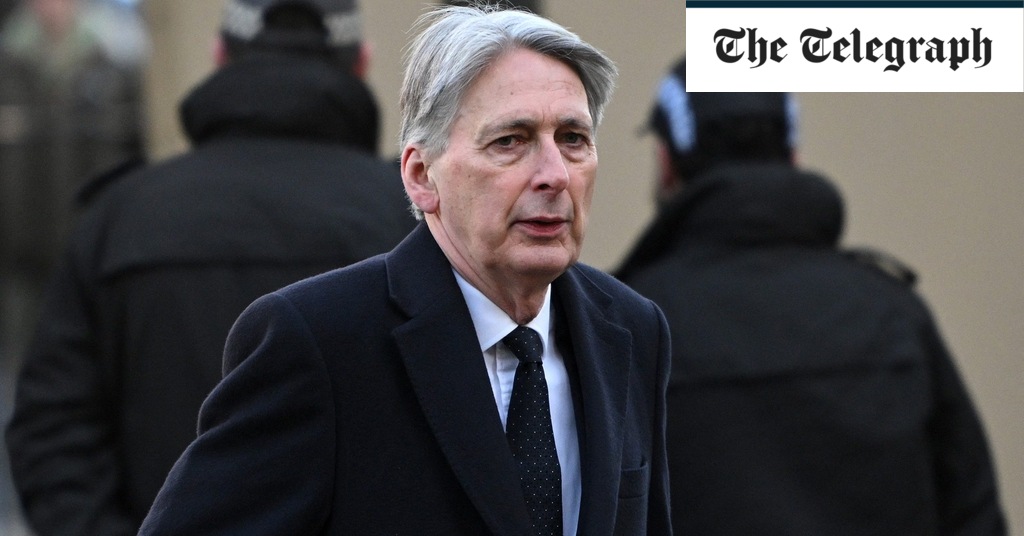Lord Hammond, the former chancellor, is facing calls for an investigation into his contact with Treasury officials about a cryptocurrency company that he went on to advise.
On Thursday, it was revealed that Lord Hammond contacted officials about the start-up company Copper less than two years after he had stepped down as chancellor.
Former ministers are typically banned from lobbying for two years after leaving government.
The contacts in early 2021 came before Lord Hammond took an official role with the company and raise questions about his relationship with Copper at a time when he had to seek government advice before taking private sector jobs.
The former chancellor emphatically denied that the meetings counted as lobbying.
Alistair Graham, former chairman of the committee on standards in public life, said: “This has a similar feel to the [Lord] Cameron/Greensill affair.
“There should be a similar investigation into whether Hammond behaved properly here. It is unfortunate that ex … chancellors should be seen to be stretching the rules like this.”
Sue Hawley, the executive director of Spotlight on Corruption, said: “Wherever a minister or senior civil servant’s ear is being bent in favour of a particular private company behind closed doors, it is essential it is disclosed.”
The Greensill lobbying scandal in 2021 concerned contacts between Lord Cameron, the former prime minister who is currently the Foreign Secretary, and ex-colleagues.
Treasury documents obtained by the Financial Times said that civil servants met Copper’s chief executive in mid-March 2021 after an “introduction via Philip Hammond/EST”. EST refers to the economic secretary to the Treasury, who at that time was John Glen.
‘Engagement might not be helpful’
One internal email said that Mr Glen had told civil servants to use Lord Hammond as an intermediary for Dmitry Tokarev, the chief executive of Copper.
Mr Glen recommended that “officials reach out to Philip to have him set up a call with Dmitry”.
Two unnamed officials “gave the initial view that engagement with this firm might not be particularly helpful”, according to the email.
The former chancellor spoke to Mr Glen in late March in a scheduled call, a week after Mr Tokarev’s meeting with Treasury officials, according to the documents released in response to a Freedom of Information Act request.
Officials prepared a briefing note on blockchain-based trading and custody systems for Mr Glen ahead of the call and adapted it with Copper in mind, the documents show.
According to the documents seen by the FT, Lord Hammond told the Treasury minister about “concerns from firms such as Copper” on the speed of regulatory change for crypto companies.
He also relayed to Mr Glen feedback from Mr Tokarev on Copper’s meeting with Treasury officials.
“Philip has been in touch with [Glen] this morning to pass on that the Copper CEO was incredibly impressed with the meeting,” according to another email between unnamed Treasury officials.
Lord Hammond left his post as chancellor in July 2019 and formally joined Copper a little over two years later, in August 2021.
He was granted Copper “growth shares”, which do not carry voting rights, in May 2022 and became the firm’s chairman in January last year.
Meetings did not require declaring
The former chancellor told the FT that he “emphatically” did not regard his interactions with Mr Glen as lobbying and “did not at any time ask John Glen to facilitate a meeting for Copper”, which he said “would be inappropriate”.
He said he had an “informal” March 2021 phone call with Mr Glen that was part of “regular, if not particularly frequent” contact with a “close political friend”.
He said the two “have a deep shared interest in the health of the UK financial services sector, and particularly in the potential of fintech to help the UK maintain its role as a globally significant financial hub”.
Lord Hammond added that “any contact [he] had with anyone was not on behalf of Copper”.
A Treasury spokesman said that all transparency processes were carried out in the correct way.
Treasury representatives “meet with many crypto firms every year to help understand the sector and inform policy development to ensure it is proportionate and safe”, he added.
A spokesman for Mr Glen said that “as a friend and former colleague” he would “regularly meet” Lord Hammond “in a private capacity”.
“These were not official meetings and did not require declaring. It was entirely appropriate for a Treasury minister to meet with a well-respected former chancellor,” he added.
Copper did not respond to the FT’s request for comment.
This news is republished from another source. You can check the original article here

